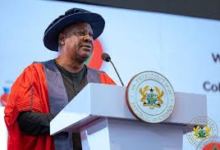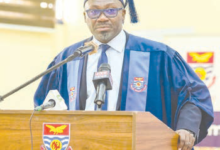
The Permanent Court of Arbitration on Monday, dismissed an investor-state arbitration instituted by Beijing Everyway Traffic & Lighting Tech. Co. Ltd. against the government after upholding a preliminary objection by the Attorney-General acting as counsel for the Government of Ghana.
The claimant invoked the jurisdiction of the tribunal under a Treaty between the Government of the People’s Republic of China and the Government of the Republic of Ghana Concerning the Encouragement and Reciprocal Protection of Investments concluded on October 12, 1989, seeking the award of damages amounting to “not lower than US$55 million”.
The Members of the Arbitral Tribunal were Professor Stavros Brekoulakis (Presiding Arbitrator), Mr. V.K. Rajah SC and Professor Richard Oppong.
Other Counsel listed as part of Ghana’s team include Ms Diana Asonaba-Dapaah (Deputy Attorney-General); Mrs Helen Akpene Awo Ziwu (Solicitor-General); Dr Sylvia Adusu; Mrs Grace Mbrokoh Ewoal and Ms Yvonne Bannerman, all state attorneys.
The dispute leading to the arbitral proceedings relates to an intelligent traffic management system project in Accra, Ghana, namely the AITMS Project.
On December 16, 2011, Ghana signed a Master Facility Agreement and other related Finance Documents with the China Development Bank for a term loan facility to develop twelve (12) infrastructure projects in Ghana, including the AITMS Project.
The claimant was awarded the AITMS Project on or about April 2012 and subsequently, on September 17, 2012, the claimant and the Ministry of Roads and Highways of Ghana signed the EPIC Contract.
Under the EPIC Contract, the claimant, Beijing Everyway, agreed to supply equipment and provide technical services to the Respondent in respect of the planning, design, construction, supervision, operation and training for the AITMS Project in Accra.
The Parties agreed to a Contract Price of US$ 100 million and an advance payment of 30 per cent.
On December 22, 2018, the Parliament of Ghana approved by resolution of the EPIC Contract. The commencement date of the EPIC Contract was fixed as August 26 2019 and the works were scheduled to be completed in 24 calendar months.
According to the claimant, between November 12 and 15, 2019, a six-member team of the Ministry of Roads and Highways of Ghana conducted a technical visit to its factory and warehouses in China to inspect the production and inventory of the equipment for the AITMS Project.
During the visit, the Ghanaian delegation observed, inspected and counted the manufactured equipment prior to shipment to Ghana.
In January 2020, the Department of Urban Roads of Ghana, under the instruction of the Ministry of Roads and Highways of Ghana, confirmed that Beijing Everyway could ship to Ghana the equipment inspected by the technical team in November 2019.
On January 15, 2020, the Department of Urban Roads of Ghana issued an onsite work permit to Everyway for the AITMS Project, covering the installation of new traffic signals, communication network and general civil works at signalised and non-signalised intersections in Accra.
On February 3, 2020, Everyway reported to the Department of Urban Roads of Ghana that it had loaded 19 containers of equipment for shipment for the AITMS Project and asked it to prepare for import customs clearance in Ghana.
About six months after the commencement of the AITMS Project, the first installations at two intersections in Accra were switched on, indicating the official launch of the AITMS Project in Ghana.
During the course of the AITMS Project, the claimant issued two Interim Payment Certificates amounting in total to US$ 21,995,728 for works that had been performed up to the date of issuance of each Interim Payment Certificate.
According to the claimant, by the time of the Notice of Arbitration (i.e. February 10 2021), Everyway had completed works with a contractual value of at least US$ 21,995,728.
According to the claimant, on March 24, 2020, the Minister of Finance of Ghana requested the Vice President of Ghana to convene a meeting to discuss the AITMS Project.
Two meetings between the Vice President of Ghana, Minister of Finance of Ghana, Minister of Roads and Highways of Ghana, Minister of National Security of Ghana, and Deputy Attorney General of Ghana were subsequently called in early April 2020, where it was agreed that two technical teams from the Ministry of National Security and Ministry of Roads and Highways of Ghana would be formed to supervise certain aspects of the AITMS Project.
It was also further agreed that Ministry of Roads and Highways of Ghana would remain responsible for certain other aspects of the AITMS Project.
On April 24, 2020, the Vice President of Ghana issued a decision letter to direct the Minister of Finance of Ghana to convey to the China Development Bank that the project would proceed as approved, with Everyway being the contractor and the Ministry of Roads and Highways of Ghana being the implementing agency on the part of Ghana.
However, on November 19, 2020, the Parliament of Ghana suddenly informed the claimant of Parliament’s decision to rescind the approval of the EPIC Contract.
Accordingly, on December 30, 2021, the claimant served Ghana with a notice terminating the EPIC Contract on the ground that the Respondent had “either directly or indirectly, unlawfully expropriated” the Claimant’s investment because the Parliament of Ghana, inter alia, “rescinded approval for the valid and effective EPIC Contract under which Everyway had completed substantial amount of work with (a) no national security or public interest justification, (b) no due domestic legal procedure, (c) in a discriminatory manner, and (d) with no compensation whatsoever for the damages caused.”
Ghana, on the other hand, argued that it has not breached the Treaty because the decision of the Parliament of Ghana to rescind the EPIC Contract with the claimant was taken in the interests of Ghana’s national security. Ghana further submitted that the Tribunal has no jurisdiction over the claimant’s claims.
Arguing the objection to the jurisdiction of the tribunal at a hearing conducted virtually on March 22, 2022, the Attorney-General, Godfred Yeboah Dame submitted that the provision of Article 10(1) of the China- Ghana Agreement limits the Tribunal’s jurisdiction to only the determination of the quantum or amount of expropriation, and not the determination of the primary issue whether there has been expropriation at all.
The Tribunal thus had no jurisdiction to determine whether Ghana expropriated the claimant’s investment in the AITMS Project pursuant to Article 4 of the Treaty or breached its contractual obligations with the claimant under the EPIC Contract pursuant to the Umbrella Clause obligations applicable in this arbitration through Article 3(2) of the Treaty.
The Attorney-General further argued that relying on Articles 4(1), 4(3) and 10(5) of the Treaty, it is Ghanaian courts that have jurisdiction over the question of the lawfulness of an alleged expropriation, not an arbitral tribunal. An investor bringing a claim for expropriation under the Treaty, must therefore do so “under domestic legal procedure” and under Ghanaian law.
Mr. Dame submitted to the tribunal that the object and purpose of the Treaty were not only to protect foreign investments but also to encourage foreign investment and foster economic cooperation between the two Contracting States.
Accordingly, this required a balanced approach to the interpretation of the Treaty’s substantive provisions, given that a focus only on the protection of foreign investments may dissuade host States from admitting foreign investments and, thus, undermine the overall aim of intensifying the Contracting States’ mutual economic relations.
Mr Dame referred to about 20 Bilateral Investment Treaties (BIT) concluded by China prior to the China-Ghana Agreement, and pointed out that none of them provided that an investor can submit any dispute, regardless of its nature, to arbitration.
Rather, these BITs provided that investors may only refer the amount of compensation to arbitration, while the question of existence and unlawfulness of expropriation is reserved for amicable settlement, or domestic courts of the respective contracting states. The same was the case for other BITs entered into by Ghana with other states. Accordingly, it was evident that neither China nor Ghana recognised the right of an investor to submit the question of the existence and lawfulness of expropriation to international arbitration prior to 1989.
The Tribunal, upon an application of relevant principles of international investment law, came to the final decision that it did not have jurisdiction to decide the Claimant’s claims for expropriation under Article 10(1) of the Treaty.
The Tribunal stated that the ordinary meaning of Article 10(1) of the Treaty cannot be read as meaning to include the question of entitlement of expropriation. In this respect, the Tribunal noted the important qualification of the term “the amount of” prior to the terms “compensation for expropriation” as placing clear limitations on the scope of questions which can be referred to arbitration. The ordinary meaning of the phrase “concerning the amount of compensation for expropriation”, according to the Tribunal, does not include the question of entitlement or determination of whether expropriation has taken place in the first place.
In relation to Costs, the Tribunal noted that both Parties have sought their costs in respect of the arbitration to date. The Tribunal invited the Parties to directly confer and seek to agree on the issue of costs or, failing such agreement, to inform the Tribunal of their agreed format and timetable of their costs submissions within 30 days of receipt of the Award. In the event that the Parties fail to agree on the issue of costs, the Tribunal will address the matter and issue an award on costs covering the arbitration proceedings to date.
BY MALIK SULLEMANA







